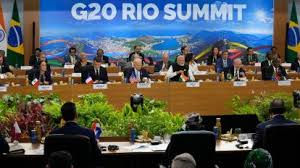The G20 Summit on November 18–19 in Rio de Janeiro, Brazil, will highlight critical global challenges, including poverty, hunger, sustainable development, and energy transitions. Under Brazil’s presidency, the summit is set to integrate climate action with social and economic priorities, earning it the moniker “Climate G20.”
Coinciding with the closing week of COP29, the summit presents an opportunity for discussions on climate finance, reforms to multilateral development banks (MDBs), the phasing out of fossil fuels, and advancing renewable energy transitions. This year’s summit also marks a historic milestone with the African Union becoming a full G20 member, reinforcing calls for equitable climate adaptation and mitigation efforts.
Brazil’s presidency has advanced international taxation discussions targeting the ultra-wealthy to boost climate finance and proposed a roadmap for MDB reforms aimed at addressing the global debt crisis. However, progress is hindered by resistance from powerful nations benefiting from the current global economic hierarchy.
The G20 communiqué highlighted the urgency of reforms to tackle the mounting debt crisis and secure sustainable financing for climate adaptation. Experts have called for more decisive action to address funding gaps and ensure commitments translate into tangible results.
Hanan Morsy, Deputy Executive Secretary of the UN Economic Commission for Africa, underscored the continent’s challenges with debt and climate crises, coupled with its youth potential and rich natural resources. She urged for a fairer international financial system to empower Africa’s role in global governance and development.
Viviana Santiago, Executive Director of Oxfam Brazil, called for urgent measures to address global inequality, emphasising the need for a just energy transition that prioritises vulnerable populations. “The G20 must hold accountable those who pollute the most and have amassed wealth through exploitative systems,” she stated.
Similarly, Marcio Astrini, Executive Director of the Climate Observatory, criticised the lack of political will among G20 nations to act on climate financing and fossil fuel phase-outs. “We know the solutions—what’s missing is the action,” he said.
With COP29 discussions ongoing and South Africa poised to assume the G20 presidency next, experts hope for stronger synergy in addressing shared priorities, including affordable financing, equitable development, and ambitious climate commitments.
Friederike Röder of Global Citizen proposed innovative measures, including a two per cent global tax on billionaires, which could generate $200–$250 billion annually for climate adaptation and poverty alleviation efforts.
Dr Michael Terungwa David, Team Lead Global Initiative, Food Security and Ecosystem Preservation: “Africa’s resources, youth potential, and unique challenges require proactive and integrated solutions that only full inclusion in global governance can provide. A permanent seat at the G20 can empower Africa to shape discussions and solutions on the climate crisis and debt in ways that better reflect its interests and challenges.”
Mayara Folly, Executive Director, Plataforma Cipó: “Though modest, the approved joint ministerial declaration, the main outcome of this dialogue effort between the G20 Sherpa Track and Finance Track, is nonetheless significant. It reinforced the commitments reached in the 1st Global Stocktake of the Paris Agreement at COP28 in Dubai. Behind the scenes, several countries are working to let the Dubai decisions fade into oblivion. Therefore, it is important that the G20 ministerial declaration explicitly included the commitment to triple renewable energy capacity and double energy efficiency by 2030, along with the pledge to promote a transition away from fossil fuels in energy systems in a fair, orderly, and equitable manner. Furthermore, we should celebrate the fact that the G20 encouraged the advancement of its commitment to achieve greenhouse gas emission neutrality, which is currently set for “by or around mid-century.” On the other hand, the difficulty faced by the Brazilian presidency in ensuring that the G20 demonstrated strong leadership on the climate agenda—beyond reinforcing already agreed-upon commitments—shows that the road to COP30 in Belém will not be easy.”
Marcio Astrini, Executive Director, Climate Observatory: “Any climate solution will only become true if G20 countries take action on the two main issues on the agenda: climate financing and the end of fossil fuel. We already have the diagnosis and know what is needed to address the problem. We lack the political will and action of this group of nations. They are the main drivers of progress or failure in tackling the climate crisis.”
The G20 is expected to reinforce its commitment to phasing out fossil fuels, expanding renewable energy, and enhancing energy efficiency by 2030. As the summit sets the stage for COP30 in Belém, Brazil aims to champion a holistic approach that aligns climate action with development goals.
Observers stress the importance of transforming commitments into concrete action, focusing on delivering equitable solutions for low—and middle-income countries. Integrating the African Union into the G20 is a pivotal step towards better global representation and progress on climate and development agendas.

 Join Daily Trust WhatsApp Community For Quick Access To News and Happenings Around You.
Join Daily Trust WhatsApp Community For Quick Access To News and Happenings Around You.


